As attorney general in California, Xavier Becerra mounted a national front to preserve the Affordable Care Act and fought the Trump administration on the environment, immigration, the census and more.
Now, on the anniversary of his confirmation as U.S. secretary of Health and Human Services, Becerra and others are celebrating his work at the community level, particularly among Latinos.
The Senate confirmed Becerra as health secretary a year ago Friday, making him the first Latino to hold the office. He stepped into the job as Covid-19 was pounding the country's hospitals and many Americans were just starting to get vaccinated.
For Latinos, the virus was taking a disproportionately higher toll than many other ethnic or racial groups.
More than half of Latinos in the U.S. know someone close to them who has been hospitalized or died from Covid, either in this country or abroad, according to the Centers for Disease Control and Prevention and the Pew Research Center.
When Becerra entered the job, just 5.8 percent of Latinos had been fully vaccinated, according to CDC estimates for recipients whose race and ethnicity is known.
As of Wednesday, 52.3 percent of Latinos were fully vaccinated, the CDC reported.
About 40 percent of Latinos eligible for a booster have had one — a higher rate than white Americans, according to CDC data.
“All the successes were not coincidence or accidental," Becerra told NBC Latino. "Otherwise they would have been done by secretaries before me. It takes work, hard work, sometimes work that is not publicly visible."
HHS succeeded by going to the Latino community; making more information on Covid and vaccinations available in Spanish and other languages; leveraging Spanish language media and its news shows; and tapping Latino leaders and groups who already work in the community to help counter disinformation and lend urgency to the need for vaccinations.
Beyond the shots, Becerra is promoting the millions of people who have signed up for Obamacare, in part because the agency quadrupled the number of so-called Navigators — groups or organizations that help individuals with the enrollment process.
The work contrasts with the initial efforts of the Trump administration, which did not provide information in Spanish on its first guide for preventing coronavirus and slashed money for outreach.
Becerra said that under his watch, 14 million people have signed up for Obamacare, 6 million of whom had not previously had health insurance. As California’s attorney general, Becerra played a key role in Congress' passage of the Affordable Care Act and later defended it in court.
"There are a lot of things you do that are never going to be seen that achieve results. And there are a lot of things you don't do that people accuse you of that have nothing to do with the job at hand," Becerra said.

Becerra has been doing a round of interviews and appearances and held a news conference, some of it bilingual, Friday on his anniversary, following criticisms that he’s kept too low a public profile as secretary amid the coronavirus crisis. Latino leaders pushed back on that criticism.
In the interview, Becerra dismissed the criticism, some of it made anonymously.
“We continue to do work, whether it’s on Covid, whether it’s on helping people get insurance through the Affordable Care Act, whether it is taking care of migrant minor children along the border, we continue to do the work," he said. "All the noise that’s out there doesn’t stop us from doing our work."
According to his staff, HHS provided $7.3 billion to 1,400 federally qualified health clinics that mainly serve Latino families to administer vaccines. The office said health centers nationally have administered nearly 15 million vaccines, with 67 percent going to racial and ethnic minorities.
"It is clear that we were able to make progress in getting all communities vaccinated in the year I've been here. It's principally been because the health centers have helped us to reach those who often are missed," he said.
"Community health centers are the backbone of our public health system, and we are going to continue to work with them," Becerra said.
The department also created a Covid-19 Community Corps, made up of 17,000 local “voices” and community leaders to encourage vaccinations.
The agency enlisted the help of 14 Latino groups known in the community, such as Mi Familia Vota, League of United Latin American Citizens (LULAC) and Poder Latinx, to help promote vaccinations among Latinos.
Although there have been gripes about his absence from the Sunday news shows, Becerra has made many appearances on Spanish-language news outlets.
He's used those appearances to reassure Latinos on the safety of the Covid-19 vaccines and its availability for undocumented people, and to urge Latinos to protect their families and community.
Much disinformation over Covid-19 has been aimed at Latinos, creating distrust and fear in the community. The agency is combating that, in part, with its Spanish language site, “Juntos Sí Podemos, which is dedicated to vaccination information and Covid prevention.
Last May, Becerra visited a vaccination center in Queens, New York, home to many immigrants, to ensure that the vaccines were free and that people would not be asked about their citizenship status.
On Monday, he stopped in Chico, California, where he spoke with local health officials and pediatricians about vaccinating children.
The high rate of Latinos without health insurance was well documented before the pandemic. But the effect of that inequality was more widely understood by Americans as employers in critical industries, such as meat processing plants, suddenly had Latino employees who could not work from home become infected or die from the virus.
“The people we leave behind are invisible and we don’t see them. The pandemic made it very difficult to no longer see them,” Becerra said.
About $80 million was awarded for groups to train and certify more than 1,500 Navigators to help Latinos and others find and sign up for health coverage, HHS announced in February.
The Covid relief law signed by President Joe Biden last year made Affordable Care Act premiums more affordable for millions, though the reductions are temporary.
Becerra is the son of an immigrant mother from Mexico and a U.S. citizen father who moved between the U.S. and Mexico. His father had worked in the fields and in road construction. His mother worked as as a secretary. One of four children, Becerra was the first in his family to earn a bachelor’s degree.
“I grew up in a Latino home and I learned what it means to work hard from watching my parents. I learned what it means and not get very much,” Becerra said. “I want to lift up those families. … We are a better country if we help those who ask very little but give very much.”
Follow NBC Latino on Facebook, Twitter and Instagram.

